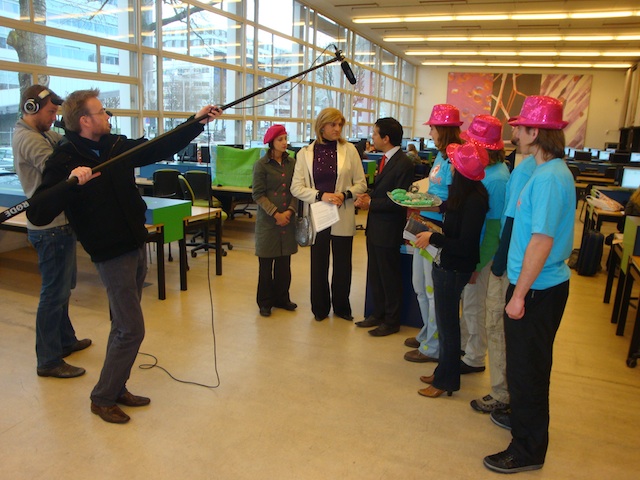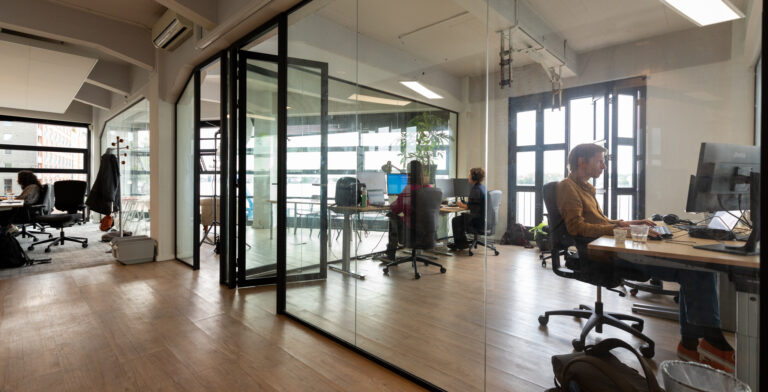
‘Shake-up Call’ for students shakes universities awake concerning fair computers
Students in Europe are highly critical of the purchasing policies of universities and universities of applied sciences. They are demanding that ICT is purchased sustainably and fairly by the institutions at which they are studying, and are campaigning against the poor working conditions in the electronics industry in low-wage countries. On 10 December, students from all parts of the Netherlands came together at the University of Utrecht, together with inspiratrice Gerry and StoereVrouwen, to give a ‘Shake-up call’ to higher education in the Netherlands.
In the past months the Procure IT Fair(opens in new window) campaign has collected thousands of signatures from students in Europe. By signing the petition students give a clear signal that they not happy with the the poor working conditions in the electronics industry in low-wage countries, and that they are demanding that educational institutions take a clear position. Prof. Paul Doop, representative of the VSNU and the HBO Council (the umbrella organisations of the universities and the universities of applied sciences, respectively) and vice-chairman of the Board of Directors of the University of Amsterdam/ Amsterdam University of Applied Sciences, was presented with the petition today, in Utrecht.
One in five desktop computers in Europe is purchased by a public sector institution. Unfortunately, social considerations play hardly any role in the purchase of computers, and price is usually the main determinative factor. But this does not need to be the case. "The current average lifespan of computers is three years. If computers were replaced every five years, this would save a great deal of money and raw materials. The money saved would pay for the extra cost of fair computers," says student Emma Daniels, an activist with Jongeren Milieu Actief (JMA).
"And this is desperately needed," says Virginia Sandjojo of the Procure IT Fair campaign, "because the production of electronics is characterised by low wages, long working days and poor working conditions. On top of this, there are a lot of problems with how old computers are disposed of."
Universities and universities of applied sciences are major purchasers of computers and ICT. With their purchasing power, they can set in motion a chain process by formulating conditions in the tendering process which ensures that human rights are respected in the production process, and no environmental pollution is caused. This message of Procure IT Fair seems to be getting through. “Sustainable purchasing of computers currently focuses primarily on environmental aspects," says Paul Doop, "As a result of this campaign, universities and universities of applied sciences are now also looking at working conditions in computer production."
Prof. Jacqueline Cramer, who was the minister responsible for sustainable purchasing in the previous cabinet, and is currently professor of Sustainable Innovation at the University of Utrecht, expressed her support for the Shake-up Call of the students.. “You have set in motion the entire decision-making process, via board members, faculties and purchasers towards the computer manufacturers. Manufacturers have to provide chain transparency and meet the demand for fair ICT," according to Jacqueline Cramer.
The following organisations took part in the Shake-up Call for the Dutch universities and universities of applied sciences.
– DWARS: GroenLinkse Jongeren
(opens in new window)
– ISO: Interstedelijk Studenten Overleg
(opens in new window)
– JMA: Jongeren Milieu Actief
(opens in new window)
– LSVb: De Landelijke Studenten Vakbond
(opens in new window)
– makeITfair
(opens in new window)
– Morgen: Studentennetwerk voor een duurzame toekomst
(opens in new window)
– Studentenraad van de Universiteit van Amsterdam | Duurzaamheidscommissie
(opens in new window)
– Gerry – Inspiratrice
(opens in new window)
– StoereVrouwen
(opens in new window)







